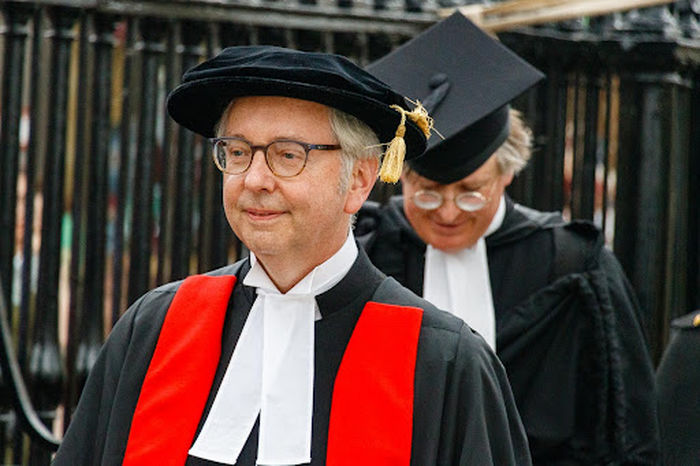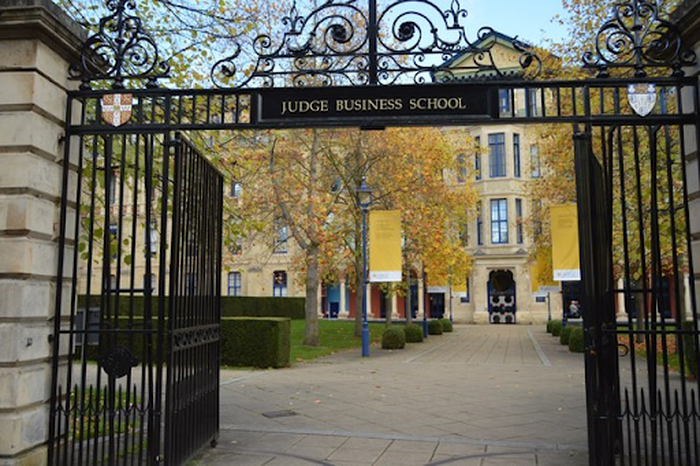Toope delivers final annual address as Vice-Chancellor of the University of Cambridge
Professor Stephen Toope spoke at lunchtime today (01/10) on Covid, access and international engagement

Professor Stephen Toope, the Vice-Chancellor of the University of Cambridge, delivered his annual address to the University at Senate House at lunchtime today (01/10).
A small group gathered to watch the speech in person and it was made available online for the vast majority of University members who were unable to attend. It was Toope’s final October address as Vice-Chancellor, as he will leave the role at the end of September 2022.
Toope began by paying tribute to members of the University who died while in post this year, as well as to HRH Prince Phillip, the Duke of Edinburgh, who served as Chancellor of the University for 35 years, and passed away in April 2021.
On the University’s approach to tackling Covid-19
“The past twelve months have been tough for everyone,” reflected the Vice-Chancellor, “I am mindful in particular of those who have suffered bereavement, or have been ill themselves, or had to care for others. I am mindful too of those who have struggled with their mental health, or had to endure isolation, and the added stresses at home and at work that the pandemic has produced.”
Toope celebrated the way in which Cambridge “tackled its biggest crisis in living memory, demonstrating not only why universities matter, but also why the University of Cambridge matters, to the city, to the country, and indeed, to the world.”
He brought particular attention to the University’s role in the Genomics UK Consortium, the impact of the University’s asymptomatic testing programme.
In a year disrupted by lockdowns, Toope said the University had “successfully” delivered hybrid teaching over the past year while retaining a “fundamental commitment to in-person learning.”
Cambridge’s “unstoppable commitment” to widening access
Next, Toope underlined the University’s commitment to widening access to students of all backgrounds, to protecting the welfare of students and staff, and to fostering a diverse and inclusive community.
According to the Vice-Chancellor, the past year has shown that Cambridge has an “unstoppable” commitment to widening access; he cited the £500m Student Support Initiative, the new Foundation Year, the creation of new scholarships, and the expansion of existing ones as examples of this commitment.
The University must continously “raise [its] game when it comes to supporting those students already with us” Toope said, and praised the launch of £100m enhanced bursary scheme, the creation of the Black Advisory Hub, and the development of the new Student Mental Health Strategy “at a time when bolstering the mental health of our students is more important than ever.”
“An institution like ours is defined by how it relates to people”
Toope hailed the work of both academic and professional services staff for their work throughout the pandemic and said that an “institution like ours is defined by how it relates to its people.” He praised the “long-overdue” reform of the professorial appointments system for increasing transparency and efficiency, and noted that the University’s finances were healthy enough to “fully fund last year’s and this year’s” promotions.
Acknowledging that “the pressures of childcare have come to the fore during the pandemic”, the Vice-Chancellor noted the construction of a fourth University Nursery for the infants of staff and praised the University’s Skills Exchange Programme for addressing the pandemic’s “uneven” impact on staff workloads.
Toope also addressed the “contentious” future of the Universities’ Superannuation Scheme (USS), the UK’s largest pensions system for higher education staff, in the speech. An unresolved dispute over how USS should be funded triggered three waves of University and College Union (UCU) strikes between 2018 and 2020, and is one of the issues on strike ballots to be held in October 2021.
Toope admitted that the pension fund’s “governance” and “approach to risk” were in need of reform, stating that the University was “committed to working with all parties to reach a sustainable solution to a persistent problem.”
Addressing freedom of speech controversies
Freedom of speech has been a contentious issue throughout Toope’s tenure, with the Vice-Chancellor frequently criticized in the national press.
He admitted that there were “big mistakes” in how the Change the Culture campaign - launched in May 2021 to combat discrimination, bullying, and harrassment in the workplace - was presented and emphasised that the campaign would not impinge on the University’s “commitment to free speech”.
“I will never apologise for seeking to make our university a better environment in which to work and to study, but freedom of speech [...] remains at the very core of what we do as a place of teaching, learning, and discovery,” Toope said.
The outcome of the December 2020 Regent House ballot on proposed amendments to the University’s Freedom of Speech Statement “confirmed what I and an overwhelming majority of members of our community already feel, that freedom of thought [...] must always be our fundamental guiding principle,” Toope continued.
Toope added that he was “sorry to say that [he] do[es] hear from some students and academics that they can feel marginalised and condescended to for their views, and said that the University “welcomed the British Government’s commitment to ensure that free and lawful speech are protected in higher education.”
On international engagement: “[the] tectonic plates of geopolitics have shifted”
Turning to the University’s international activities – another area that has been a source of controversy throughout his tenure as Vice-Chancellor – Toope argued that the “staggering global challenges” we face “require more international engagement, not less,” but added that “we cannot be naive about how we engage with our partners.”
He acknowledged that in his four years in office the “tectonic plates of geopolitics have shifted significantly,” highlighting China’s changing place in the world in particular.
The Vice-Chancellor also addressed international engagement in the national press today, writing for Times Higher Education that it must be undertaken with our “eyes wide open.” He referenced the University’s new set of principles for managing risks in international engagement, announced yesterday (30/09).
In the wake of revelations about the University’s involvement with Huawei, Toope asserted that “we must also build ways to work with partners in nations that do not conform to Western norms and values, while protecting our own principles and standards,” arguing that change is made through engagement, not isolation.
These principles, Toope argued in his address, will ensure that the University is not “immobilised” by geopolitics, but able to pursue international partnerships “on our own terms and in accordance with our values.”
The vice-chancellor concluded his speech by declaring that even though “we are not yet out of the pandemic woods,” he is “modestly optimistic” for the year ahead because “we have learnt so much from the past year,” and urged that “we turn all of our energies to what we do best: creating, curating, and communicating knowledge.”
 News / SU reluctantly registers controversial women’s soc18 December 2025
News / SU reluctantly registers controversial women’s soc18 December 2025 News / Dons warn PM about Vet School closure16 December 2025
News / Dons warn PM about Vet School closure16 December 2025 Features / Should I stay or should I go? Cambridge students and alumni reflect on how their memories stay with them15 December 2025
Features / Should I stay or should I go? Cambridge students and alumni reflect on how their memories stay with them15 December 2025 News / Cambridge study finds students learn better with notes than AI13 December 2025
News / Cambridge study finds students learn better with notes than AI13 December 2025 News / Uni registers controversial new women’s society28 November 2025
News / Uni registers controversial new women’s society28 November 2025












